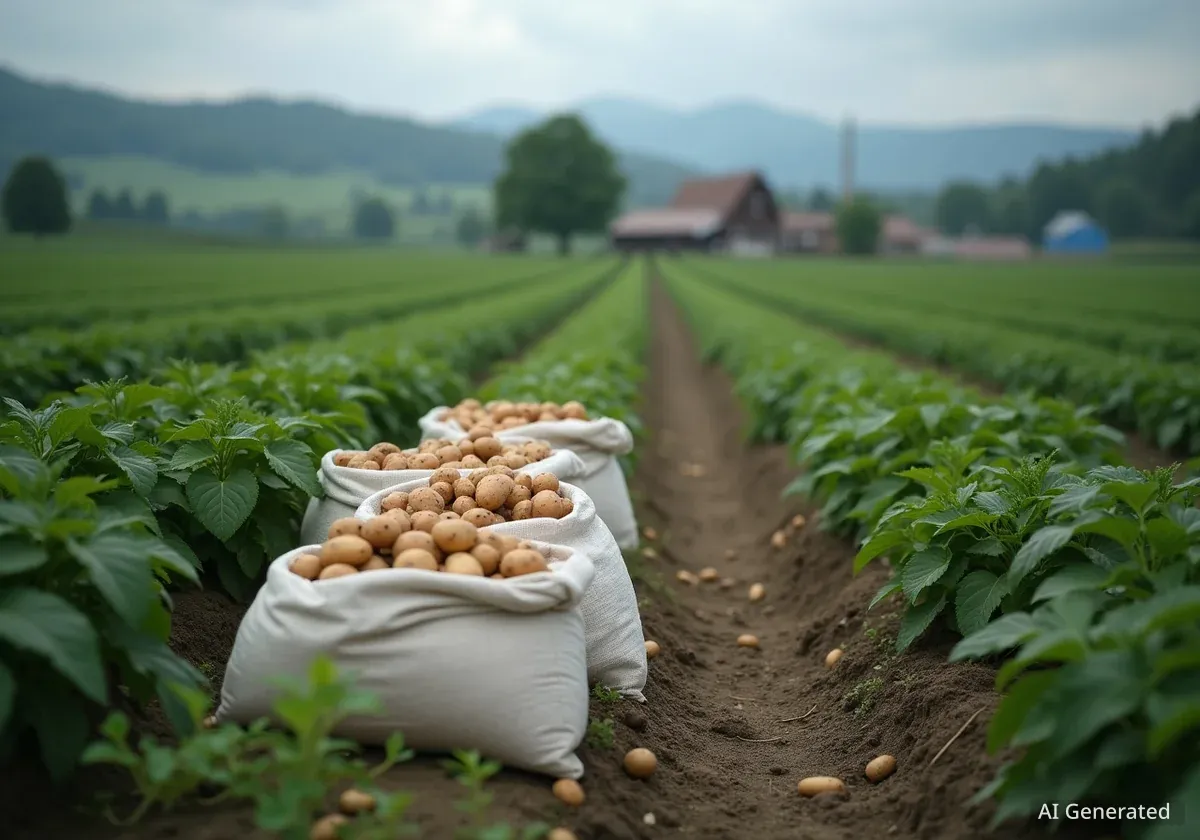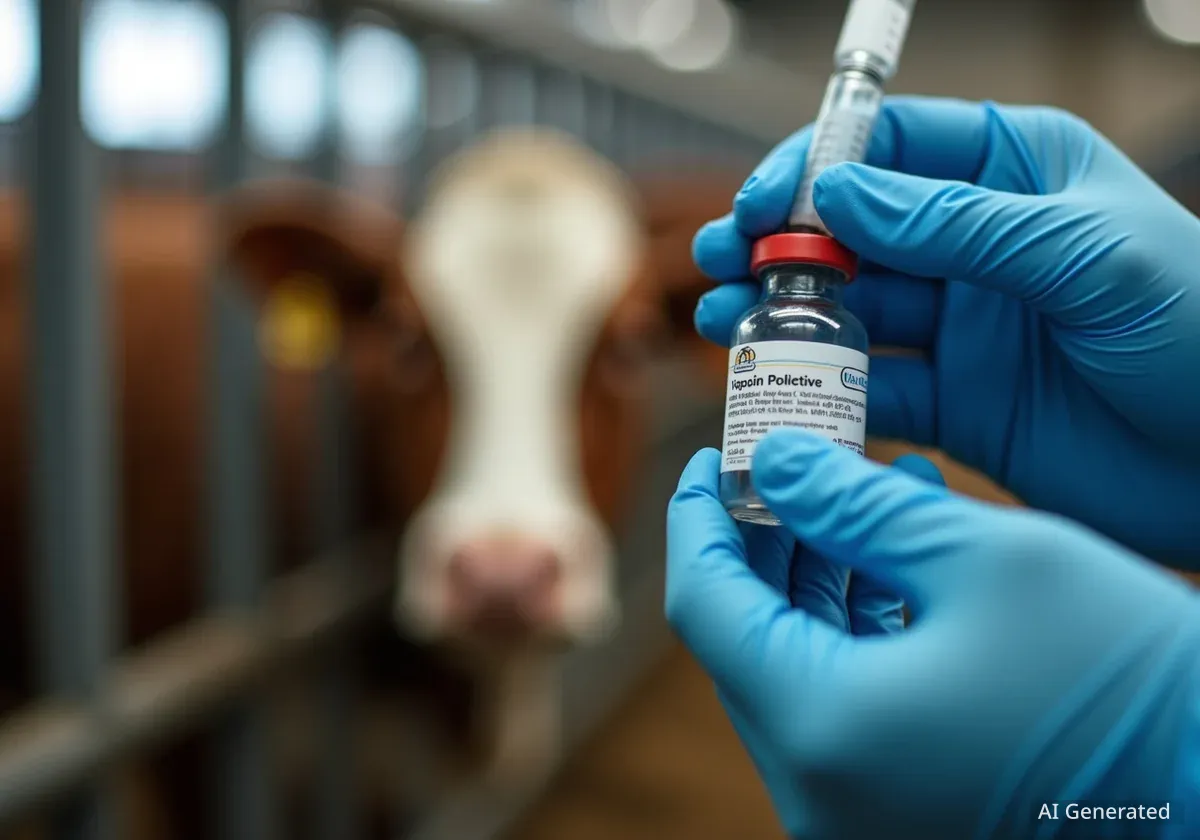Swiss potato producers are currently managing an unexpectedly large harvest, which has led to a significant surplus of potatoes across the country. This oversupply is creating economic challenges for farmers, who are now facing stricter purchasing standards from buyers and turning to social media to sell their excess stock directly to consumers to avoid waste.
Key Takeaways
- An above-average potato harvest in Switzerland has resulted in a market surplus.
- The issue is the large quantity of potatoes, not their quality.
- Buyers have implemented stricter acceptance criteria, making it difficult for farmers to sell their entire crop.
- Some producers are using social media to sell potatoes directly and prevent them from being discarded.
- A national utilization fund offers financial compensation to farmers for unsold produce.
An Abundance of Potatoes Creates a Challenge
This year's growing season has produced a larger-than-expected potato crop, a situation that is causing significant issues for Swiss farmers. While a large harvest might seem positive, the resulting surplus has saturated the market, putting downward pressure on producers.
According to Ruedi Fischer, a potato farmer from Bätterkinden and the former president of the Swiss Potato Producers' Association, the core of the problem is volume. "We are not stuck with the potatoes because of quality issues," he clarified. The issue stems from a harvest that exceeded all projections.
Understanding Agricultural Contracts
In Swiss agriculture, many farmers operate under pre-season contracts with large buyers like supermarket chains and food processors. These agreements, typically finalized months in advance, specify the quantity and quality of produce to be purchased. An unexpectedly large harvest means farmers have significant amounts of produce that fall outside these contractual obligations.
Fischer confirmed that contracts established at the end of 2024 are, to his knowledge, being honored by buyers. However, these agreements did not account for the sheer volume of this year's yield. "This leads to surplus quantities that could not be calculated in advance," he explained.
Stricter Standards and Economic Pressure
The oversupply has prompted major buyers to tighten their acceptance standards. In years with smaller harvests, buyers might be more lenient regarding minor imperfections such as shape, size, or superficial blemishes. With an abundance of choice this year, they can be more selective.
This means potatoes that would have been sold in a normal year are now being rejected. These rejected potatoes, while perfectly edible, do not meet the stricter cosmetic criteria. This leaves farmers with large quantities of high-quality produce they cannot sell through their usual channels.
"The situation is anything but pleasant for the producers. The joy over the large harvest quickly evaporates, and that is understandable," Ruedi Fischer stated, highlighting the emotional and financial strain on farmers.
The economic impact is direct. Farmers invest significant resources in planting, cultivating, and harvesting their entire crop. When a portion of that crop cannot be sold, it represents a direct financial loss, as the costs have already been incurred.
From Field to Fork
Potatoes are a staple crop in Switzerland, with thousands of tons consumed annually in various forms, from fresh potatoes to processed products like french fries and chips. The current surplus affects the entire supply chain, from the farm to the processor and retailer.
Farmers Turn to Social Media and Support Systems
In response to the crisis, some producers have taken their sales efforts online. Social media platforms have become a vital tool for farmers trying to connect directly with consumers. Through online posts, they offer their surplus potatoes for sale, hoping to salvage some revenue and prevent perfectly good food from going to waste.
These initiatives highlight a growing movement towards reducing food waste and supporting local agriculture. Consumers who buy directly from farmers can often get fresh produce at a fair price while helping producers manage their excess inventory.
The Role of the Utilization Fund
For farmers unable to sell their surplus, a safety net exists. The so-called "Verwertungsfonds," or utilization fund, provides a mechanism for financial relief. Fischer explained that producers can report their unsold stock to this fund.
The fund offers compensation to farmers for potatoes that cannot be sold on the primary market. This system is designed to mitigate the financial risks associated with unpredictable agricultural yields and provide stability to the farming community. While it doesn't replace the income from a successful sale, it helps to cover some of the production costs.
Future Outlook and Weather's Influence
While the situation is currently challenging, Fischer has not written off the season entirely. He noted that future weather conditions could still play a significant role. Changes in weather can affect the remainder of the harvest period or the storage life of the potatoes, potentially altering market dynamics in the coming weeks and months.
The current surplus serves as a reminder of the inherent volatility of agriculture. Even with careful planning, factors like weather can lead to unexpected outcomes, turning a successful harvest into a complex economic problem for the very people who grow the nation's food.




